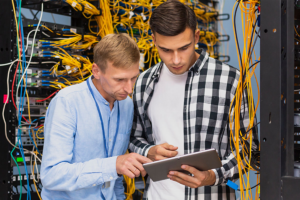Governments, telecoms, and tech leaders around the world are grappling with how to handle a surge in demand for internet access.
Quarantines and stay-at-home orders amid the coronavirus pandemic have made internet access as critical as any other public service, forcing governments around the world to have tough conversations about how to expand access and availability. On a call organized by the United Nations and the International Telecommunication Union, world government, telecoms, and technology leaders discussed astronomical spikes in network demand and how they have tried to address them.
Doreen Bogdan-Martin, director of the Telecommunication Development Bureau of the International Telecommunication Union, said internet providers were seeing spikes in demand reaching 800%.
“COVID-19 is taxing global networks to the limit. Operators and platforms are reporting huge, huge surges in traffic as the world has transitioned almost overnight to online working, schooling, shopping, and socializing,” Bogdan-Martin said.
“We heard during a high-level dialogue yesterday organized by The World Bank, ITU, WEF and GSMA that some providers are reporting demand spikes as high as 800%. These surge levels would surely have quickly knocked out other kinds of infrastructure,” she said.
“It is an enormous credit to the global digital community that they are able to continue to make these networks and services available but also at the same time that so many operators are working to expand services to people who now need it more than ever.”
SEE: Coronavirus: Critical IT policies and tools every business needs (TechRepublic Premium)
The call featured government leaders from countries in Africa, Asia, South America and Europe as well as industry leaders from a variety of internet providers, plus Google and Facebook.
Since the coronavirus pandemic took hold of the world, Bogdan-Martin said she has worked with other industry leaders to create a platform that has served as a global repository of emergency actions that the digital community is using to ensure the availability, accessibility, and resilience of networks and internet resources.
United Nations Under-Secretary-General Fabrizio Hochschild noted that the COVID-19 crisis has exacerbated longstanding concerns many have had about unequal access to the internet worldwide.
In both “rich” and “less developed” nations, lower income populations are struggling to gain access to affordable internet, exacerbating inequality in situations that will only get worse as the world’s economy contracts because of efforts to contain the virus, he said.
There was little difference between countries and more of a separation between jobs that could be digitized versus those that could not.
“Even in New York at this moment, there are those who can continue working and continue receiving their salary because their jobs can be digital. And there are those who can continue working in the analog field, most notably health professionals and people in supermarkets. But there are those whose jobs cannot be digitalized and are not deemed essential workers, who will come out of this much poorer than everyone else,” Hochschild said.
“These are problems and I agree that many of them require medium and long-term thinking as well as short-term thinking on what can be done about it. Many problems are related to regulation, while some of the problems are related not to the presence of infrastructure but to the presence of affordable access, which can theoretically be overcome.”
Pressure on networks
The major focus on the call was how stressed network providers were across the globe and what efforts governments were making to help relieve the pressure.
Industry leaders like Stephen Spengler, CEO of the satellite company Intelsat, noted that there will need to be wider efforts once the crisis is over to expand broadband access through hybrid systems that incorporate different network technology like terrestrial fiber, fixed and mobile wireless, as well as satellites.
“Over the last several weeks, it’s clear that the internet has continued and accelerated its role as critical infrastructure as important as water, electricity, highways and other utilities. In general, we have watched the networks perform well and stay resilient in the face of absolutely massive traffic growth,” said Nokia Deepfield CTO Craig Labovitz.
“We have seen growth in a period of days and sometimes less than a week that usually occurs in a year. We first watched the change of traffic in the network begin in China, followed by Europe and later the Americas. Individual applications such as WhatsApp grew by 40% in a matter of days. Some telecommunications and video conferencing applications grew by 700% or 800% in the same time period.”
Labovitz went on to say that weekday traffic grew by 40% or more at peaks and that in general, the overall network growth has been completely unprecedented. Labovitz and others said they were seeing weekend growth of 60% to 70% over the peaks.
Robert Pepper, head of global connectivity and technology policy at Facebook, echoed those remarks, saying the networks have been “amazingly resilient” and that they “are actually upgrading and doing very well.” He noted that internet companies like Facebook were being proactive about helping network providers by lowering bitrate traffic and limiting some high-quality video.
“What is clear is that within the core of the internet, we’ve seen significant changes to the way the network is being built. We’ve literally been watching the internet evolve overnight as providers, content providers, content distribution networks, and governments have made changes to networks,” Labovitz said
“We have seen thousands of individual vendors and engineers making changes to add capacity, adding additional links, adding additional hardware to the network. Risking health during the pandemic to keep the network going. But due to the significant capacity within the network and due to the contribution of governments and thousands of engineers, the network has continued to have capacity added while continuing to meet the demands.”
Government efforts to help
Hochschild and other speakers laid out some basic measures many nations have taken to help internet providers over the past few weeks, which include better spectrum allocation and licensing, zero rating certain websites or applications, and emergency communication preparedness plans. He also highlighted the need for greater collaboration between the public and private sectors.
Countries need to map out the needs of their citizens and identify what issues are the most pertinent. More spectrum needs to be released and the licensing process needs to be made easier and faster.
He cited a number of countries like Singapore that have given people free access to broadband and free hardware to use during the crisis.
Ursula Owusu, minister of communications for the Republic of Ghana, spoke about a number of efforts her government has taken to help providers expand access to the internet, lower the cost of access, and handle the increased demand.
Owusu told listeners that the crisis has made everyone realize how important the digital world and digital infrastructure is for business continuity as well as the continuity of life and social services around her country.
“The traffic jams have moved from the streets to online,” she said.
“As we’ve seen increased traffic online and with data usage, what we’ve done in Ghana is to provide additional spectrum to the telecommunication companies which needed it. We offered two of them for free on loan for three months to enable them to increase their capacity and provide functionality for video conferencing, better connectivity for government agencies, businesses and individuals.”
Ghana’s regulators have also given companies approval to use Universal Mobile Telecommunications Service technology over 2G to provide data to rural areas as well as all sectors of the network. The country’s leaders have zero-rated all educational and healthcare sites, meaning mobile network customers are given a specified amount of data usage to view these sites for no extra charge.
Owusu added that they have zero-rated digital infrastructure for virtual office tools, allowing public officials, government officials and others to work from home without overusing their data. Transaction feeds for mobile money transfers have been waved up to a certain amount while settlement fees have also been waived for electronic payment services used by all digital financial service providers.
The country also offers toll free access to emergency call centers and COVID-19 inquiries in addition to setting up centralized contact centers dedicated to information about the virus. Owusu said the government has partnered with all of the country’s telecommunications operators so that they can send out countrywide emergency messages about the virus from one central location. Citizens of Ghana can also use an app to report their symptoms.
She added that they are hard at work addressing cybersecurity concerns that have arisen as criminals attempt to take advantage of the crisis for monetary gain.
Dozens of other leaders on the call lauded her for her efforts and said they too would put some of her ideas into practice.
Increase in security concerns
Nnenna Nwakanma, chief web advocate of the World Wide Web Foundation, said many around the globe were also concerned about the increase in cyberattacks now that more people were using the internet in general.
She cited a number of attacks on hospitals and healthcare institutions in the Czech Republic, France, Spain, Thailand, and the United States while mentioning that there needs to be more collaboration worldwide on protecting critical health infrastructure in times of crisis.
Hochschild noted that many internet providers are also saying they see increases in security attacks and phishing attacks that correspond with the increases in demand and traffic.
Labovitz agreed, saying that on top of the worries about threat to healthcare institutions, there were even more concerns about cyberthreats to critical network infrastructure. But he said providers were already hard at work protecting and securing systems.
“The networks were made for this. Over my career, I’ve watched the networks grow from an academic and research network to now a global mission-critical platform,” Labovitz said.
“I think that given the criticality, it’s important as a global society that we can continue these investments in the infrastructure and in the coordination of building out and interconnecting the different networks.”
Also see

Image: Getty Images/iStockphoto
Source of Article




